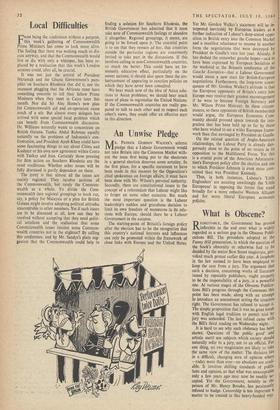What is Obscene?
ed lY Ji- be of be o- le to at re REGRETTABLY,. the Government has proV inflexible to the end over what is wide regarded as a serious gap in the Obscene Pub cations Bill. The procedure adopted in 1 Fanny Hi// prosecution, in which the question the book's obscenity or otherwise had to decided by the senior Bow Street magistrate, pr yoked much protest earlier this year. A looplu in the law seemed to have been employed keep the case from a jury. The argument th such a decision, concerning works of literatu issued by reputable publishers, ought propel to be the responsibility of a jury, is a power' -one. At various stages of the Obscene Public tions Bill's progress through the Commons ti point has been made, along with an attar to introduce an amendment setting the situati right. The Government has refused to accept The simple proposition that it was no great bre with English legal tradition to permit trial jury was unheeded. The last refusal came WI the Bill's third reading on Wednesday night.
It is hard to see why such obduracy has be shown. Questions of 'the public good' a artistic merit are subjects which society shot naturally refer to a jury, not to an official. F one thing, no two magistrates are likely to ta the same view of the matter. The decision 1 in a difficult, changing area of opinion Mu —today more than ever—no absolutes arc ava able. It involves shifting standards of pub taste and opinion, so that what was unacceptal only a few years ago may now be readily g eepted. Yet the Government, notably in I person of Mr. Henry Brooke, has persisten refused to budge. Censorship is too important matter to be treated in this heavy-handed wl ul Pt on it. ak bY th
en Id or ke il- cs re lic le 1C- he tlY a Y.










































 Previous page
Previous page